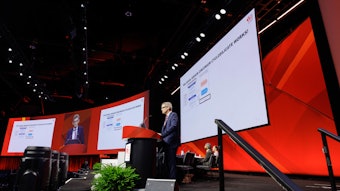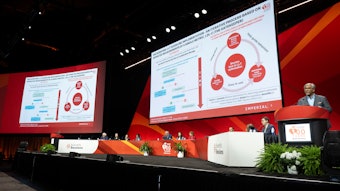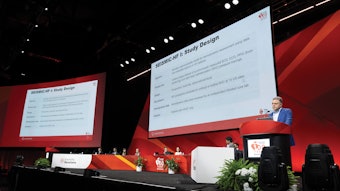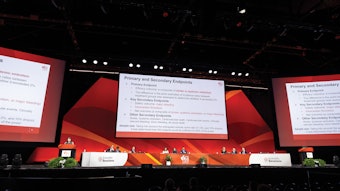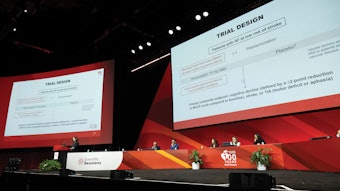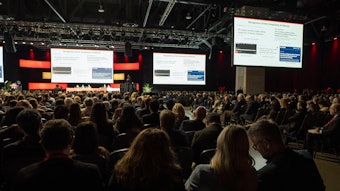LBS coverage (2020) | The latest clinical trial results in managing thrombosis in stents

Researchers in Sunday’s “Stents, Valves and Clots” Late-Breaking Science session revealed:
- Drug-eluting stents with rapid polymer degradation are not inferior to standard polymer DES.
- One-month dual anti-platelet therapy is not inferior to recommended therapy following DES.
Rapid polymer degradation may favor new stent design
Biodegradable polymers that coat drug-eluting stents may not delay vessel healing after stent implantation the way conventional stents can, according to the PIONEER III Study.
The study compared cardiovascular outcomes for a conventional durable biodegradable drug-eluting stent (DP-DES) and a novel polymer that biodegrades in four to six weeks (HT-DES). The HT-DES was not inferior to the DP-DES after 12 months of follow-up.
The study is expected to continue through late 2024, said Alexandra Lansky, MD, FAHA, professor of medicine and head of the Yale Cardiovascular Research Group at Yale School of Medicine in Connecticut.
The global trial randomized 1,088 patients to a sirolimus-eluting HT-DES, the SINOMED Supreme Healing-Targeted DES, and 544 patients to an everolimus-eluting stent, XIENCE or Promus DP-DES across 74 study centers in Japan, North America and Europe.
The mean age of patients was 64, and all had symptomatic ischemic heart disease or acute coronary syndromes that required elective or urgent intervention, Dr. Lansky said. All were acceptable candidates for percutaneous coronary intervention using DES and for emergent coronary bypass graft surgery.
The primary endpoint was target lesion failure, a composite of cardiac death, target vessel myocardial infarction or ischemia-drive target lesion revascularization.
The study was powered to show noninferiority at 12 months and superiority at five years.
At 12 months, 5.4% of the HT-DES group had target lesion failure (TLF) versus 5.1% of the DP-DES group, a 0.32% risk difference. Researchers didn’t find significant differences in the rates of device success, ischemia-driven revascularization, stent thrombosis or adverse events.
“We have shown that this novel DES is safe, effective and non-inferior to conventional DES,” Dr. Lansky said. “We will have to wait for longer-term data to see if the concept of improved vascular healing with more rapid polymer degradation results in improved treatment benefit compared to more familiar durable polymer stents.”
One-month dual anti-platelet therapy may benefit most patients
Six to 12 months of dual anti-platelet therapy with aspirin and a P2y12 inhibitor after implantation of a drug-eluting stent may not be necessary in all patients, based on this study.
In the first head-to-head randomized comparison, researchers found that one month of DAPT plus aspirin after DES implantation isn’t inferior to the recommended six to 12 months of DAPT for a composite of cardiac outcomes and major bleeding.
Across 23 centers in Korea, 1,507 patients in the one-month DAPT plus aspirin monotherapy group received a polymer-free Biofreedom stent and 1,513 patients in the longer-term group received a Biomatrix or Ultimaster stent.
Followed for 12 months, the patients were evaluated for a composite of cardiac death, nonfatal myocardial infarction, target vessel revascularization, stroke or major bleeding. Secondary endpoints included all-cause mortality, cardiac death, nonfatal MI, target vessel revascularization, definite or probably stent thrombosis, ischemic or hemorrhagic stroke and major bleeding.
In the one-month DAPT group, composite events occurred in 5.9% of patients versus 6.5% of the six- to 12-month DAPT group. The hazard ratio for the one-month DAPT therapy followed by aspirin monotherapy was 0.9, p<0.001 for noninferiority compared to the recommended 6 to 12 months of DAPT therapy.
“These findings suggest that DAPT for one month followed by aspirin monotherapy could be used for most patients receiving a polymer-free Biofreedom stent, not just those with high bleeding risks,” said Meyong-Ki Hong, MD, PhD, professor of medicine at Yonsei University College of Medicine in Seoul, Korea.
“Discontinuing a P2y12 inhibitor after one month in daily clinical practice may be associated with better patient compliance, lower costs, a lower risk of bleeding and overall superior convenience and level of comfort for both patients and physicians.”



